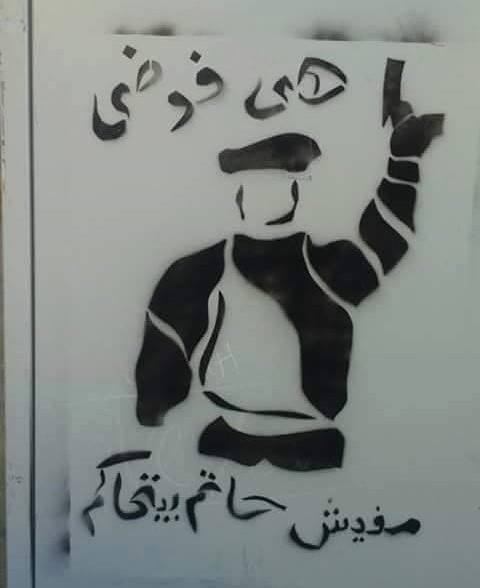Latest NEWS
- Aswat Masriya, the last word
- Roundup of Egypt's press headlines on March 15, 2017
- Roundup of Egypt's press headlines on March 14, 2017
- Former Egyptian President Hosni Mubarak to be released: lawyer
- Roundup of Egypt's press headlines on March 13, 2017
- Egypt's capital set to grow by half a million in 2017
- Egypt's wheat reserves to double with start of harvest -supply min
- Roundup of Egypt's press headlines on March 12, 2017
Five low-ranking policemen arrested in Luxor torture case

Graffiti featuring a police officer carrying a gun taken from a popular Egyptian movie "Chaos".
CAIRO, Dec. 6 (Aswat Masriya) - Five low-ranking policemen were ordered detained by prosecutors on Saturday evening as part of an investigation into the killing of Talaat Shabib, who allegedly died of torture in a Luxor police station.
His death has sparked public outrage in the Upper Egypt province of Luxor, and has attracted the attention of media nationwide.
The low-ranking policemen are accused of "participating in the crime of beating which led to the death of the citizen Talaat Shabib while in custody by police officers from the investigation [unit], inside the Luxor police station."
The decision on Saturday follows one on Friday, in which prosecutors ordered the detention for four days of four police officers, as part of an investigation into Shabib's killing after the release of a forensic report on Shabib.
The report confirmed that there was "an injury to the man's body, which led to his death."
Egypt's constitution prohibits torture in all its forms and considers it "a crime that is not subject to prescription", as per article 52.
Shabib, 47, was arrested on Nov. 24 at 11 pm at a cafe in the district of al-Amawya on suspicion of possessing Tramadol, a pain killer used ubiquitously as a recreational drug in Egypt. Within a few hours his family received information that he died as he was being transferred to Luxor International Hospital.
According to government statements cited in the press, Tramadol is ranked first among illicit drugs abused in Egypt, taken by 40.7 percent of drug abusers.
While the government has restricted the drug's sale, enforcing prison sentences on pharmacists caught dealing illicitly in the prescription drug, enforcement is poor. The little pill is still easy to get, despite the price hike.
Graffiti filled the walls of Luxor's streets in public condemnation of his death.
Amid public grief over Shabib, friends and relatives of Shabib launched a Facebook page "We are all Talaat Shabib", in a case reminiscent of Khalid Saeed's, the 28-year-old, who was tortured to death on June 6, 2010 at Seedi Gaber police station in Alexandria and who's badly disfigured picture leaked out of the morgue went viral on social media.
Luxor prosecutors launched an extensive investigation, which they said was "not biased", promising that those responsible will be held accountable for their actions.
Shabib's case is but one of a slew of cases of alleged police torture that have caught the public's attention recently.
Earlier in November, Amr Saeed Abu Shanab died in custody at Shebeen al Qanater police station in Qaluibya governorate north of Cairo. Abu Shanab is believed to have been arrested on theft charges.
Also in November, Ismailia was home to the death of veterinarian Afify Hassan Afify, who died while being interrogated by police.
Police brutality was one of the triggers of the Jan. 25, 2011 uprising, sparked by protests on Egypt's national police day, aimed to draw attention to the police's use of excessive, at times fatal, force.










